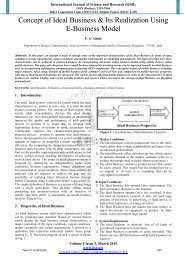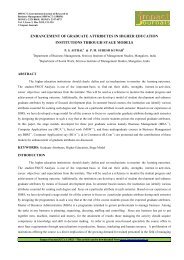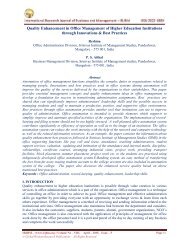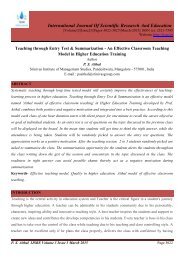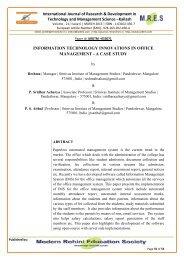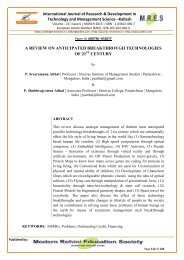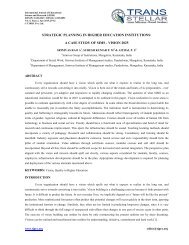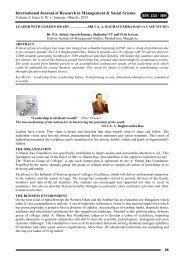How Innovations and Best Practices can Transform Higher Education Institutions : A case study of SIMS
Education has become competitive so as the educational institutions. In order to survive the competition, institutions have to improve the quality of their services. Changes in culture, aspiration and levels of skills required in securing employment for students, force higher education institutions today to rework on their educational models and add value to each and every aspect of their service. Innovations and best practices serve to enhance quality and add value. Srinivas Institute of Management Studies (SIMS), which combines technology, management and social service education has identified and implemented innovations and best practices to differentiate itself among the competitors and to add value in its educational services. In this paper, we have discussed innovations, small and big, develped indigineously and implemented during last four years. They are broadly classified under six key aspects namely "curricular aspects, teaching-learning and evaluation, research, consultancy and extension, infrastructure and learning resources, student support and progression, and governance, leadership, and management". The paper also contains some of the intitutional and individual faculty best practices having visible impact on the quality of higher education imparted by the institution. The best practices concern admission, fees, attendance, teaching, performance, skill building, employability, student involvement, collective learning, value addition, ensuring transparency, information dessimination etc. Finally two institutional best practices are elaborated with its aim of practice, underlying principles and concepts, particular contextual features or challenging issues that have had to be addressed in designing and implementing the practice, and its implementation, including its uniqueness in Indian higher education, evidence of success, identifying the problems encountered and resources required to implement the practice.
Education has become competitive so as the educational institutions. In order to survive the competition, institutions have to improve the quality of their services. Changes in culture, aspiration
and levels of skills required in securing employment for students, force higher education institutions
today to rework on their educational models and add value to each and every aspect of their service. Innovations and best practices serve to enhance quality and add value. Srinivas Institute of
Management Studies (SIMS), which combines technology, management and social service education
has identified and implemented innovations and best practices to differentiate itself among the competitors and to add value in its educational services. In this paper, we have discussed
innovations, small and big, develped indigineously and implemented during last four years. They are
broadly classified under six key aspects namely "curricular aspects, teaching-learning and evaluation, research, consultancy and extension, infrastructure and learning resources, student support and progression, and governance, leadership, and management". The paper also contains some of the
intitutional and individual faculty best practices having visible impact on the quality of higher education imparted by the institution. The best practices concern admission, fees, attendance, teaching, performance, skill building, employability, student involvement, collective learning, value
addition, ensuring transparency, information dessimination etc. Finally two institutional best practices are elaborated with its aim of practice, underlying principles and concepts, particular contextual features or challenging issues that have had to be addressed in designing and implementing the practice, and its implementation, including its uniqueness in Indian higher
education, evidence of success, identifying the problems encountered and resources required to implement the practice.
You also want an ePaper? Increase the reach of your titles
YUMPU automatically turns print PDFs into web optimized ePapers that Google loves.
International Journal <strong>of</strong> Management (IJM), ISSN 0976 – 6502(Print), ISSN 0976 - 6510(Online),<br />
Volume 6, Issue 2, February (2015), pp. 83-98 © IAEME<br />
In order to encourage research culture, a number <strong>of</strong> research centres have been constituted in<br />
the areas <strong>of</strong> expertise available with faculty in-charge <strong>of</strong> these centres. Opportunity is provided in<br />
the curriculum delivery to promote scientific thinking, spirit <strong>of</strong> questioning, expression <strong>of</strong> creative<br />
ideas, experimentation <strong>and</strong> learning by doing. Appraisal <strong>of</strong> faculty performance is done through<br />
comprehensive performance management systems <strong>and</strong> the feedback is communicated to all<br />
concerned. It is found that through this there is an increase <strong>of</strong> about 20 percent performance each<br />
year. Students appraise the faculty through a structured format on a variety <strong>of</strong> parameters.<br />
Transparency is maintained in internal assessment <strong>of</strong> students through taking into account internal<br />
examination, assignment presentations <strong>and</strong> attendance in awarding internal marks. Students with<br />
attendance shortage for genuine reasons are encouraged to attend additional classes through its<br />
innovative ‘Save a year’ programme. Absence from class is substantiated through declaration signed<br />
by parents. Both internal examination marks <strong>and</strong> attendance are communicated to the parents<br />
regularly by short message service (sms).<br />
Faculty development programmes are periodically conducted. Consultancy <strong>and</strong> research are<br />
encouraged. Institution takes efforts in attracting eminent persons to visit the campus <strong>and</strong> interact<br />
with teachers <strong>and</strong> students. Most <strong>of</strong> the faculty have either secured Ph.D. or pursuing research<br />
leading to Ph.D. The institution strives to address cross cutting issues such as environment, gender<br />
etc. through conducting programmes related to the theme. Industry – institution – community<br />
interactions are maintained through village adoption, organizing job fairs, <strong>and</strong> short duration NGO<br />
internship which involve all students. Grievance committee, sexual harassment committees <strong>and</strong> antiragging<br />
committee have been constituted to ensure that students <strong>and</strong> staff have a hassle free life. A<br />
lot <strong>of</strong> welfare measures have been introduced for the staff <strong>of</strong> the institute. Alumni are invited as<br />
distinguished guests to chair programmes. An Alumni association has been constituted for<br />
networking, relating to placement assistance, admissions etc. Student council gives opportunity for<br />
students to elect their student representatives <strong>and</strong> participate in forum activities, annual seminars,<br />
conferences through fund raising, <strong>and</strong> sponsorship from public. College magazine, news letter <strong>and</strong><br />
e-magazines bring out creative talent among students. The administration <strong>of</strong> the institute is<br />
decentralized.<br />
The institute maintains high academic result at the level <strong>of</strong> 100% in P.G. Courses <strong>and</strong><br />
reaching near to that in U.G. courses. Placement cell provides career guidance to prepare the students<br />
for placements. All alumni are well settled in jobs or successful entrepreneurs managing their<br />
enterprise. Introduction <strong>of</strong> events <strong>of</strong> innovations <strong>and</strong> best practices have resulted in substantial<br />
increase in the st<strong>and</strong>ard <strong>of</strong> the institute to the merit requirement <strong>of</strong> an accreditation agency. During<br />
these 14 years <strong>of</strong> its efforts <strong>of</strong> preparing young men <strong>and</strong> women for challenges in life, Srinivas<br />
Institute <strong>of</strong> Management Studies sincerely tried to impart comprehensive knowledge or Samagra<br />
Jnana <strong>and</strong> actual experience <strong>of</strong> the perfection or Vijnana to its students.<br />
III.<br />
INNOVATIONS AT <strong>SIMS</strong><br />
The college has introduced several innovations which have helped to create a positive impact<br />
on the functioning <strong>of</strong> the college. TABLE 1 contains the <strong>Innovations</strong> introduced in the college<br />
during last 4 years.<br />
85




